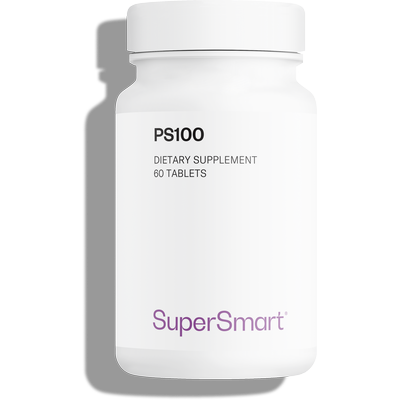17-05-2016
Nourish your neurons before they degenerate
 Forgotten where you left your keys? Can’t remember what the film was called that you saw yesterday, or the name of that person you met recently?
Forgotten where you left your keys? Can’t remember what the film was called that you saw yesterday, or the name of that person you met recently?
While very irritating, these incidences of forgetfulness are, for the vast majority of us, isolated cases and nothing to worry about.
If they keep happening, however, they could be the early signs of age-related degenerative diseases (Alzheimer’s, Parkinson’s, senile dementia …).
However, as long you act early, aging of the brain is not inevitable. Certain natural substances, in particular phosphatidylserine - a phospholipid abundant in the brain - can stop and even reverse the process.
How to recognize the first signs of brain aging
The brain is made up of around 85 billion neurons. These nerve cells communicate with each other by means of neurotransmitters such as acetylcholine - this plays a major role in memory function in terms of retention and retrieval of information.The loss of memory capacity is the result of various age-related phenomena. With increasing age, even a healthy body produces less acetylcholine. Vessels which supply the brain narrow and harden; with decreased blood and oxygen, neurons can no longer produce and release neurotransmitters as effectively as they should. Aging also reduces our ability to absorb certain nutrients which have a role in healthy brain function.
The signs of decline in cognitive ability are often difficult to spot in the early stages of cerebral aging. Often, we need to look to our immediate environment in order to realise that we might have a problem.
Among the first warning signs to watch out for are :
-
• attention deficit (as if the person was sometimes ‘absent’)
• frequent memory lapses (forgetting names, common words),
• reduced capacity for reasoning,
• or a tendency towards depression and withdrawal (decreased motivation and pleasure in doing things, mood problems, avoiding social situations).
In most cases, signs of decline will become noticeable after the age of 65. However, they can sometimes appear much earlier, around the age of 40 and even before that, according to certain studies. (2)
Early screening for such signs is thus a major health issue since acting as early as possible is vital in order to reverse the process of cognitive decline and memory loss.
However, screening is far from systematic for people over 60 and almost non-existent for younger individuals.
Reversing the ravages of time with phosphatidylserine
 Studies investigating solutions to cerebral aging have identified the primary role played by phosphatidylserine in brain function. Present in all our cells, this phospholipid is found in high concentrations in the brain’s cell membranes.
Studies investigating solutions to cerebral aging have identified the primary role played by phosphatidylserine in brain function. Present in all our cells, this phospholipid is found in high concentrations in the brain’s cell membranes.
Abnormalities in the cell membranes of neurons are one of the main causes of age-related memory problems; phosphatidylserine can restore the integrity of these membranes. Phosphatidylserine actually works deep within the brain to improve the transmission speed of the nervous impulse and to rebalance levels of certain transmitters, including acetylcholine. Phosphatidylserine therefore helps counter the effects of aging on the brain’s cell membranes.
The only directly bioavailable dietary source of phosphatidylserine is animal brains. Due to the fact that we now consume very little in the way of brains or phospholipid-rich offal, phospholipid intake has halved from its previous estimated daily amount of between 4 and 6 grams.
In addition, the production of phosphatidylserine by the body is complex and requires significant energy expenditure which can be problematic when disease is present or when aging is a factor. That is why additional intake in the form of a supplement is recommended to prevent and combat all forms of age-related cognitive decline.
In the 1970s, phosphatidylserine-rich extracts of animal brain were given to elderly subjects in France, Italy, Portugal and Scandinavia, to counter various forms of dementia, memory loss and depression.
Methodologically-sound scientific studies have highlighted the indisputable benefits of such supplementation for optimal cognitive function:
-
• In 1993, a clinical study of 425 elderly subjects suffering from serious cognitive decline showed that administering 300 mg a day of phosphatidylserine over a 6-month period improved cognitive performance. (3)
• A series of clinical studies over several years involving 500 participants with Alzheimer’s disease or another form of senile dementia produced similar findings. (4)
• A double-blind, placebo-controlled trial of 149 elderly people with memory loss suggests that taking 100mg phosphatidylserine, three times a day for three months improved scores in neuropsychological tests. (5)
• A placebo-controlled, double-blind, preliminary study of 10 elderly women suffering from nervous depression showed that daily administration of 300mg of a brain phospholipid extract over 30 days reduced intensity of symptoms, as well as improving the subjects’ cognitive performance. (6)
Some scientists suggest that preventative supplementation from the age of 40 or earlier is a better idea since the process of cognitive decline generally starts at around this age.
Advice on choosing your phosphatidylserine supplement
Early studies on the effects of phosphatidylserine were carried out mainly using the animal-origin form but due to the risk of bacterial contamination, this form has been replaced by soya-based products with similarly promising results:-
• In 2000, in an Israeli study of 30 subjects, 300mg a day of plant-origin phosphatidylerine was administered over 12 weeks. The researchers reported a significant improvement in cognitive ability and memory in treated subjects. (8)
• In 2010, a double-blind, placebo-controlled study conducted in Japan on 78 elderly individuals with memory problems also showed benefits from supplementation with between 100mg and 300mg of soya phosphatidylserine over 6 months. (9)
Therapists generally recommend a course of treatment consisting of a dose of 300mg of pure phosphatidylserine for one month, followed by a maintenance dose of 100mg a day for 3-5 months (or even indefinitely in the case of recognised cognitive or memory problems). This corresponds to four plastic bottles of this product (240 capsules).
For individuals suffering from seasonal depression, Alzheimer’s disease or Parkinson’s disease, some therapists prescribe 300mg to 500mg a day for unlimited periods.
--------------------------------------------------------------------------
Sources :
1) Mild Cognitive Impairment as a Target for Drug Development, Steven H. Ferris, Ph.D. Silberstein Aging and Dementia Research Center, New York University School of Medicine.
(2) British Medical Journal, « Timing of onset of cognitive decline : results from Whitehall II prospective cohort study, Archana Singh-Manoux, 2012. Neurobiology of Aging, Volume 30, Issue 4 , Pages 507-514, April 2009.
(3) Cenacchi T, Bertoldin T, et al. Cognitive decline in the elderly: a double-blind, placebo-controlled multicenter study on efficacy of phosphatidylserine administration.Aging (Milano). 1993 Apr;5(2):123-33.
(4) Heiss WD, Kessler J, et al. Long-term effects of phosphatidylserine, pyritinol, and cognitive training in Alzheimer's disease. A neuropsychological, EEG, and PET investigation.Dementia. 1994 Mar-Apr;5(2):88-98. Delwaide PJ, Gyselynck-Mambourg AM, et al. Double-blind randomized controlled study of phosphatidylserine in senile demented patients.Acta Neurol Scand. 1986 Feb;73(2):136-40.
(5) Crook TH, Tinklenberg J, et al. Effects of phosphatidylserine in age-associated memory impairment.Neurology. 1991 May;41(5):644-9.
(6) Maggioni M, Picotti GB, et al. Effects of phosphatidylserine therapy in geriatric patients with depressive disorders.Acta Psychiatr Scand. 1990 Mar;81(3):265-70.
(7) T.H. Crook. Treatment of Age-Related Cognitive Decline: Effects of Phosphatidylserine in Anti-Aging Medical Therapeutics, Vol II, edited by R.M. Klatz, Health Quest Publications, Chicago,1998:20-29. T.H. Crook, J. Tinklenberg, J. Yesavage, W. Petrie, M.G. Nunzi, D.C. Massari. Effects of phosphatidylserine in ageassociated memory impairment. Neurology. 1991;41:644-649.
(8) Schreiber S, Kampf-Sherf O, et al. An open trial of plant-source derived phosphatydilserine for treatment of age-related cognitive decline. Isr J Psychiatry Relat Sci. 2000;37(4):302-7.
(9) Kato-Kataoka A, Sakai M, Ebina R, Nonaka C, Asano T, Miyamori T.Soybean-derived phosphatidylserine improves memory function of the elderly Japanese subjects with memory complaints. J Clin Biochem Nutr 2010, 47: 246-55.
Order the nutrient mentioned in this article
Further reading
28-08-2019
Though many people are not aware of choline, it is actually recognised as an essential nutrient by the prestigious US National Academy of Medicine 1...
Read more10-10-2016
In India, turmeric is used to treat a wide variety of ailments including gastrointestinal problems, inflammation, headaches, infections and colds. It is turmeric’s curcuminoid content,...
Read more28-06-2017
As the control centre of the central nervous system, the brain has to deal with a constant flow of data, processing millions of bytes of...
Read more© 1997-2026 Fondation pour le Libre Choix
All rights reserved
All rights reserved
Free
Thank you for visiting our site. Before you go
REGISTER WITHClub SuperSmart
And take advantage
of exclusive benefits:
of exclusive benefits:
- Free: our weekly science-based newsletter "Nutranews"
- Special offers for club members only


















